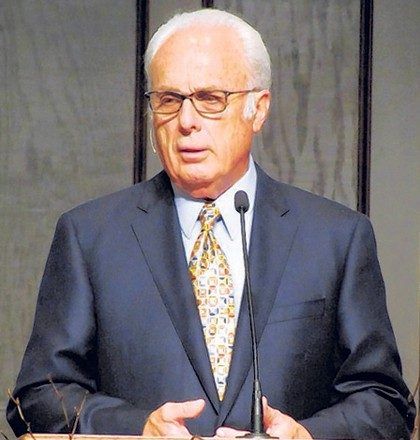
Dr John MacArthur answers questions on the eternal Sonship of Christ. The following is a transcript of Question Time at the FIEC Conference at Caister in April 1997. Jonathan Stephen was the interviewer.
Jonathan Stephen: John, a lot of people think that you are a bit of a heretic, quietly! And what I really want to talk to you about first of all is this whole thing about ‘eternal Sonship’.
Now there will be some people here who haven’t a clue what we are talking about, and there are others who have come here a little bit suspicious about you because of this, and I’ve had one or two letters about it as well, so I would just be pleased if you could clear this up.
You say something in your commentary on the book of Hebrews ‘that Christ did not officially assume the title and role of Son of God until his Incarnation’. I’ve got one comment here from somebody today saying, ‘For one to accept the Trinity is it not necessary to believe that Christ was the Son of God from the beginning? To believe otherwise is to say that God only became the Father at the Incarnation. The titles of Father and Son are surely inseparably linked’ — and you know all the questions that stem from that. Would you like to just address that issue?
John MacArthur: Well, first of all, I appreciate the opportunity to answer that. First of all, I think when I wrote the Hebrews commentary originally I did a very inept job of articulating what I meant and, unfortunately, with my mis-speaking in that commentary — it’s OK to do that in a sermon, and then run! — but when you put it in a book it follows you.

I did not articulate that as appropriately as I should have articulated it and it did raise some unnecessary questions. Let me see if I just can’t, very briefly, answer the question by saying there have been debates about whether or not ‘the Son’ as a title for Christ is an eternal title or an incarnational title; that is to say, is the Son the Son from eternity, or is that a term tied to a particular function that he engaged upon in his Incarnation? Same question could be asked about the title ‘Lamb of God’ — is that an eternal title of Jesus Christ, or is it a title related or connected to the work that he did in his Incarnation? And there are many other titles, many other references to the ‘Messiah’, ‘Rose of Sharon’, ‘Lily of the Valley’ — things like that have come and gone in terms of Christianity that associate in some way with some function of Messiah in his Incarnation.
Backing up from that, let me say this: that the relationships within the Trinity are eternally the same. The first person of the Trinity, the second person of the Trinity, the third person of the Trinity (as we know the Father, Son and Holy Spirit) are eternally the same and their relationship is eternally the same. So I don’t want anybody to think that, when you try to identify a certain fulfilment of one of the essential titles of Christ, you are saying anything at all about his essence.
Jesus Christ is eternally deity, eternally the second member of the Trinity. And in that sense I’m very comfortable, and in fact I’ve already made some changes in late editions of that commentary. I’m very comfortable with saying that he is eternally the Son of God. I refer to him in that way. You probably heard me do that this morning when I referred to the purposes of God in eternity past unfolded in the counsel of the Trinity when the Father came to the Son and determined to express his love by giving him a redeemed humanity. I have always referred to the second member of the Trinity, not as ‘the second member of the Trinity’, but as ‘the Son’ — realizing that inherent in the term ‘Son’ is an anthropomorphic expression. That is to say, in the actual reality of the eternal Trinity, Father and Son aren’t the same as they are to us because they talk about generation, and the Father did not generate the Son. People get into that and it gets real technical talking about eternal generation.
But I really do believe that we can call the second member of the Trinity ‘the Son of God’ eternally. All I was trying to say in Hebrews was that where it says in the first chapter ‘Thou art my Son, this day have I begotten thee’ that there was a sense in which with the Incarnation the second member of the Trinity, the Son of God, entered into the fullest expression of what that Sonship, or that service to the Father, indicated. Now, stretching that a little further, I believe that there is a certain servitude that the second member of the Trinity, the Son of God, offered to the Father, even in the Old Testament. There are two titles of the Son of God in the Old Testament that indicate this. One is the ‘Angel of the Lord’, which means that he was despatched by the Father to carry a message. The other is the ‘Servant of the Lord’, which Isaiah likes to use to refer to him. In both cases submission is implied. So, in all the unfolding of redemptive purpose in the Old Testament, as well as in the New at the point of Incarnation, it is obvious to me that the Son, the second member of the Trinity, took on a subservient rôle to the purposes of the Father in the redemptive history. But I believe in the Old Testament he is identified as the ‘Angel of the Lord’ somewhat frequently; he is identified as the ‘Servant of the Lord’; but only on two occasions at the most is he called the ‘Son of God’ — Psalm 2 being the most significant one. That seems to speak about his Incarnation. But when you get to the New Testament, the name ‘Son’ is applied to him hundreds of times. So, all I would like to say is — he is eternally the Son of God in the sense that his identification, his essence, his deity and his relationship to the Father never changes. But the fulness of what that title implies, which is submission, is expressed redemptively in the incarnation.
Jonathan Stephen: OK, I think I’m going to leave it there, because there are all sorts of questions that we could ask — it gets very complicated, doesn’t it?
John MacArthur: But if I had to do it over again, I would take that part out of my commentary, and just say I’m happy to call him eternally the Son of God — I really am. All I was trying to do was to distinguish ‘Today have I begotten thee’ — what happened at that point that marked out a begetting of the Son. And it says his Sonship was indicated in the Incarnation, and Romans 1:4 says it was affirmed in the ressurrection. He was a faithful Son, and the Father affirmed that by raising him from the dead. But I really do believe in his eternal Sonship in the sense that his essential nature is the same from eternity. He is related to the Father eternally.
Somebody asked me onetime if I ever changed my view, and I said ‘I hope!’ I’m certainly anxious to conform to the Word of God, and I apologize for saying things in a rather careless way so that it left a wrong impression.
Jonathan Stephen: We are really grateful for that answer. Thanks very much







